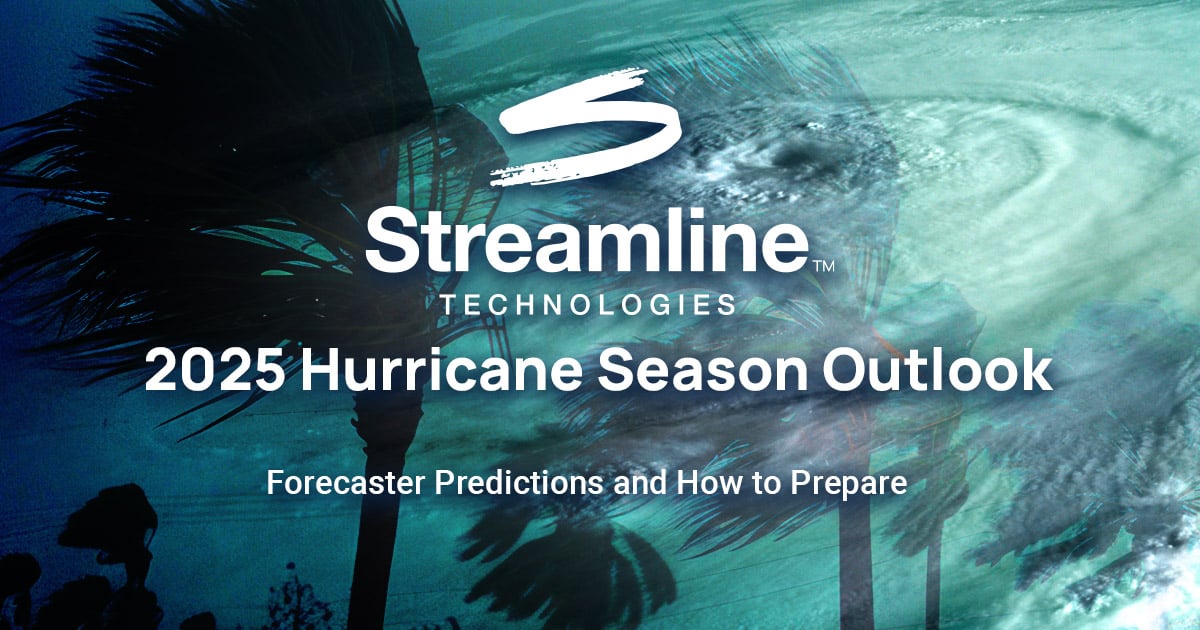Prepare for the 2025 Atlantic hurricane season with insights on key forecast factors, expert predictions, and cutting-edge flood resilience solutions from Streamline Technologies.
With less than 100 days remaining until the start of the 2025 Atlantic hurricane season, meteorologists and emergency response teams are closely monitoring conditions to anticipate the upcoming season as millions of people across the Atlantic basin brace themselves for what’s to come.
Following the devastating 2024 season, which saw 18 named storms – including 11 hurricanes and five major cyclones – impact communities across the Southern United States, forecasters are finalizing their assessments and refining their forecasts for the months ahead.
Year in Review: The 2024 Hurricane Season
While the 2024 season was forecasted to be one of the most active in recent history, the actual storm count ended slightly below expectations. Nevertheless, the season served as a stark reminder that even in years with moderate activity, hurricanes can still cause widespread devastation. Tropical Storm Helene, for example, inflicted severe damage across the Southeast, underscoring the critical need for preparedness and timely forecasting.
And despite the destruction, forecast improvements were evident with the National Hurricane Center’s 2024 forecasts standing as the most accurate in history, a testament to decades of advancements in meteorology and predictive modeling. According to former NOAA Administrator Rick Spinrad:
"Our forecasts are improving by 24 hours every decade. The five-day forecast today is as precise as the three-day forecast was 20 years ago."
You can read more about what will be remembered as one of the most intense and devastating hurricane seasons in recent memory in our blog: A Look Back at the Record-Breaking 2024 Atlantic Hurricane Season

What to Expect and Key Factors: The 2025 Hurricane Season
The 2025 Atlantic hurricane season officially runs from June 1st through November 30th.
Early forecasts from organizations such as NOAA, Colorado State University (CSU), and the European Centre for Medium-Range Weather Forecasts (ECMWF) have suggested a near-normal hurricane season, based on the anticipated number of named storms, hurricanes, and major hurricanes. In other words, activity is expected to be closely aligned with historical norms observed over recent decades.
Still, while this may seem reassuring, experts warn that seasonal outlooks remain subject to change based on evolving environmental factors – particularly in the lead-up to peak hurricane months. It's also crucial to remember that even a so-called “average” season can result in significant impacts.
Key Factors Influencing the 2025 Season:
- ENSO Conditions: The world transitioned into a La Niña phase in late 2024, which typically favors increased hurricane activity in the Atlantic. However, 2025 is expected to see a return to neutral ENSO conditions, which historically can result in a wide range of storm activity.
- Sea Surface Temperatures: Warm Atlantic waters can fuel hurricane development, and early indications suggest that the Atlantic Main Development Region (MDR) will have slightly above-average temperatures.
- Trade Winds: Weaker-than-normal trade winds can contribute to reduced wind shear, providing a more favorable environment for hurricane intensification.
Historic Comparisons: Research suggests that neutral ENSO years often bring heightened hurricane activity along the Gulf Coast and Florida Peninsula, while the East Coast may experience lower-than-average impacts.
Early Forecast Predictions:
- Tropical Storm Risk (TSR): Estimates 15 named storms, seven hurricanes, and three major hurricanes, which closely align with the 30-year average.
- European Centre for Medium-Range Weather Forecasts (ECMWF): Projects a near-average season with about 12 named storms and five hurricanes.
- Colorado State University (CSU): Predicts an above-average season with 17 named storms, including nine hurricanes and four major hurricanes, citing unusually warm Atlantic waters and a low chance of El Niño as key drivers.
- National Oceanic and Atmospheric Administration (NOAA): Expected to issue its official seasonal forecast in May 2025.
Forecast Prediction Overview:
- Predicted Named Storms: 12 – 17
- Predicted Hurricanes: 5 – 9
- Predicted Major Hurricanes: 3 – 4
While early projections may indicate a "near-average" season, it’s important to remember that even a "normal" hurricane season can have catastrophic consequences. In 2024 alone, hurricanes Helene, Milton, and Beryl collectively caused nearly $121.1 billion in damage and took nearly 300 lives.
With hurricane-related disasters becoming more costly and frequent, preparation must remain a top priority.
Streamline Technologies: Cutting-Edge Solutions for Flood Forecasting & Resilience
Preparation is key to mitigating the impacts of hurricanes, and advanced early warning systems play a crucial role in keeping communities safe.
Streamline Technologies offers innovative solutions for flood forecasting and early warning, helping communities, emergency responders, and flood management teams anticipate and mitigate the impacts of flooding several days in advance.
FloodWise™: Real-Time Flood Forecasting
- Operating in real-time, this cutting-edge tool forecasts flooding at the street, house, and infrastructure levels several days in advance, enabling emergency response teams to allocate resources effectively and mitigate impacts.
StormWise™: Advanced Hydrologic and Hydraulic Modeling
- A hydrologic and hydraulic modeling engine that identifies flood risks, models flood scenarios, and ensures compliant stormwater management.
Both FloodWise™ and StormWise™ empower key decision-makers with the tools necessary to make informed decisions and reduce the risks associated with hurricanes and extreme weather events.

Stay Ahead of the Storm
As we count down to the 2025 Atlantic hurricane season, proactive preparation remains the best defense against catastrophic weather events. Streamline Technologies is committed to providing innovative solutions that help communities prepare, respond, and recover more effectively.
So, don’t wait until a storm is on the horizon – Contact our team today to learn how FloodWise™ and StormWise™ can enhance resilience and protect your community from the devastating impacts of hurricanes and flooding.
TAGS
Blogs